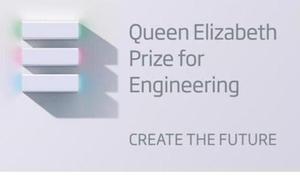Creating the future – journeys in engineering from UK to Japan
The Queen Elizabeth Prize for Engineering celebrates ground-breaking innovation of global benefit to humanity. Nominations close on 14 July.

QEPrize logo
What does it take to launch a human into space? To put on an Olympics games that becomes the greatest show in the world? To restore youthful function to a damaged body? To make information accessible to anyone, anywhere in the world? Behind all the great achievements that have the most impact of our world, you will find talented engineers working to turn scientific knowledge into practical applications.
The Queen Elizabeth Prize for Engineering (QEPrize) is a global £1 million prize that celebrates the engineers responsible for a ground-breaking innovation that has been of global benefit to humanity. The objective of the QEPrize is to raise the public profile of engineering and to inspire young people to become engineers.
Engineering Excellence
The 2013 QEPrize winners helped revolutionise the way we communicate and enabled the creation of whole new industries. Today, a third of the world’s population use the Internet. Robert Kahn, Vinton Cerf and Louis Pouzin made seminal contributions to the protocols that together make up the fundamental architecture of the Internet. Tim Berners-Lee created the World Wide Web and vastly extended the use of the Internet beyond email and file transfer. Marc Andreessen, while a student and working with colleagues, wrote the mosaic browser, which was widely distributed and made the Web accessible to anyone, anywhere in the world, and triggered a huge number of applications.
Both UK and Japan are well known for engineering excellence across a wide range of fields and our two countries have a long history of learning from each other. From William Kinnimond Burton, the Scot who developed Tokyo’s urban sewers and built the city’s first skyscraper, to present day Japanese companies such as Sony, Nissan and Toshiba who are not just major investors in the UK but key partners for innovation in British manufacturing.
As a company active in products ranging from semiconductors to power plant systems, Toshiba recognises that engineering offers powerful tools and solutions for tackling the challenges society faces. For this reason, we are delighted to support the Queen Elizabeth Prize for Engineering. Our approach to engineering focuses on innovation and imagination. The Queen Elizabeth Prize does the same and is a marvellous way to inspire the next generation of engineers worldwide.
Norio Sasaki, President and CEO, Toshiba Corporation
The Next Generation
In March 2014 UK engineering professors from the Universities of Bristol, Cambridge, Imperial College London, Leeds, Southampton and University College London came to Japan to discuss the future of engineering education to help nurture a new generation of engineers who have the knowledge and skills to have a global impact.
An exciting new wave of engineering talent is emerging. Elspeth Finch is the Director of the Futures team at Atkins. She is working on a series of reports into aspects of infrastructure resilience, the first of which looks at the challenges for water in the UK to 2050. She recently led a report on Future Proofing Cities in partnership with the Department of International Development and UCL, which addresses the risks to 129 cities from climate change, resource limitations and ecosystem damage. In June 2013 she was awarded the Royal Academy of Engineering’s Silver Medal for business and technical leadership in over 100 transport planning projects in the UK and internationally.
Dr Eleanor Stride co-founded a research group in 2006 developing new methods for making microbubbles and capsules that can be used for medical purposes. She has received a number of awards for her work and published over 60 journal articles and 60 conference papers. Her work has led to the development of new patented technologies in biomedicine and she has recently set up a spin-out company with colleagues. Eleanor is currently continuing her research at Oxford University at the world-leading Institute of Biomedical Engineering.
When such engineering talent comes together, great things can be achieved. Marking its centenary year, the Japanese Society of Civil Engineers will hold an international workshop this September for young civil engineers to discuss how their profession can help tackle the challenges facing the world in 2050.
Get involved
If you want to highlight an example of outstanding engineering, go to QEprize website to nominate. If you are an engineer, why not join the debate online or share details of your work to inspire the next generation? #createthefuture
This is a wonderful opportunity for engineers everywhere to show the world their work and have it honoured on an international platform. To simply be nominated for this award would be an achievement in itself but to win it would be to write your name in the annals of engineering history.
Lord Browne of Madingley, Chair QEPrize Foundation
Anyone can nominate. Nominations close at 12.00pm BST on 14 July 2014 and the winner will be announced in Spring 2015. Go to the QEPrize website to participate.
Quotes and images reproduced with kind permission of the Queen Elizabeth Prize for Engineering.